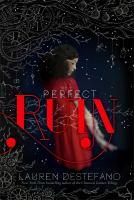
Sheltered and naive. That's the narrator of this book. She's always lived a protected, easy life, and doesn't have much to be anxious about. Of course, she lives in a world without poverty. Where there has never been a murder in her lifetime. Where crime, accidents, and disease are minimal, and almost everyone lives happily and safely to old age. (As far as she knows, anyway.) So life is good and there's no reason to question anything.
Except that she's a human. A human teen, at that. There might be no reason to question anything, but it's human nature and impossible to avoid. Morgan worries she's an "irrational" because of her daydreaming nature that has her imagining fantastical and impossible things, wondering if there might be more to life than what she knows. She believes she's odd for having these thoughts, that surely no one else ever thinks the same. So she does her best to hide them and act like everyone else on Internment, her floating city in the sky.
But then something strange happens: the train that runs around the edge of Internment stops for the first time in Morgan's life; not only stops, it actually goes backwards. She is filled with a nervous disquiet by something so strange. Soon she learns it was because a girl her age was found murdered on the tracks, and everything changes. She never knew such a thing could happen. She never knew she would have reason to feel fear, validity to question and doubt the security of her worldview.
The murdered girl is just the start. Other equally unthinkable events follow. And secrets begin to emerge, secrets that have Morgan realizing she is not as strange or unbalanced or irrational as she imagined. Not in the least.
DeStefano does a nice job delicately handling Morgan's awakening, making her a complex and believable character. Secondary characters are treated equally well. I especially enjoyed the interpersonal relationships and the romance. Prominently communicated through character perspectives and interactions is the excellent world-building, with a history, religion, and society that shape them. The second half of the book, once everything falls apart, becomes a bit too fast and action-centric for my tastes and I'm annoyed at how steep a cliff the ending hangs over, but I enjoyed it enough that I expect I'll be reading the second one to see what happens.
A solid 3.5 stars.
Each chapter is opened with a quote from "Intangible Gods," an essay by the murdered girl. Here are a few:
- Maybe what frightens us about the edge isn't the fear of our mortality, but the thoughts it leads us to have.
- Plenty of rules are laid out for us in our history book. They were discovered by first being broken.
- So many of the things I've always wanted are the things I've been taught to fear.
- Free will isn't quite the same as freedom.
